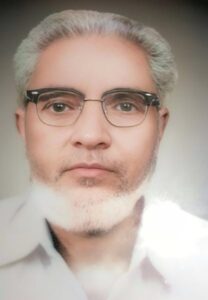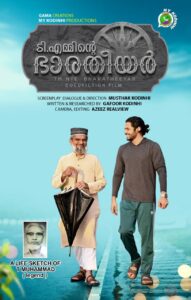A recently-released film throws light on T Muhammed, whose works were pervaded by a broad spirit that recognized the brotherhood of mankind
At a time when distrust among communities is deepening fast, any attempt to bridge the gap is to be welcomed. TMnte Bharatheeyar, a recently released docu-fiction film on the renowned scholar and thinker T Muhammed is one such. The one-hour film directed by Mushthak Kodinhi, a journalist, touches upon the various facets of TM, a researcher, author, thinker, historian, educationist, editor, and religious scholar.
The scholar who spent a lifetime researching and thinking produced over a dozen books and several essays dealing with subjects his contemporaries even dared to touch.
Though he studied only till Class II, he mastered Arabic, English, Urdu, Sanskrit, Persian, and Hebrew. Apart from Quran and Hadith, he also delved deep into Vedas, Puranas, and Upanishads. His seminal work on Indian culture, Bharatiya Samskarathinte Adiyozhukkukal (Undercurrents of Indian Culture) is considered to be a classic. The book published in 1976 ventured into an unchartered domain and introduced some pathbreaking thoughts about Indian philosophical traditions. A product of his original thinking, this book introduced a new outlook on human history.
Explaining what prompted his research, he said despite having innumerable traditions, castes, and sub-castes in India, no serious attempts have been made to understand each other. It led to animosity and distrust among communities. He believed that the only way to achieve peaceful co-existence is to reassert the oneness of humanity and reclaim the larger brotherhood among communities.
“More than 45 years ago, what T Muhammed did was an outstanding effort. He was right to conclude that a stream of monotheism was very evident in India’s ancient scriptures. His conclusions are more relevant today as there is an urgent need to understand other cultures and traditions for India to exist as a multi-faith society,” said Dr MGS Nayaranan, former chairman of ICHR and one of India’s leading authorities on ancient India.
By analyzing archaeological evidence and scriptures, TM traced the roots of the Dravidian inhabitants of the Indus civilization to Mesopotamia. He argued they were the descendants of Japheth, one of the three sons of Noah, and that they were predominantly Sabians, an ancient religious community. To support his claim, he cited archaeological evidence of bathing ghats and the ritual of purification by water, which is central to this religion and requires adherents to bathe three times a day before prayer.
Born in 1916 in an orthodox Muslim family at Kodinhi in Malappuram, his early education was confined to various ‘darses’ (traditional education in mosques). But in the 1960s and 70s, when his community was reluctant to embark on modern education, he urged it to address the modern world’s challenges by going beyond the textual reading of religious scriptures. He shared some of his thoughts in his book Modern Thoughts. In the essay Sharia and Ijtihad (Sharia and research), he argued for reinventing laws to address the challenges of the modern world within the boundaries of Islam. He also championed women’s rights and specifically wrote a book Women in Islam and in other civilisations. He argued for the political participation of Muslim women when their presence in public life was a rare sight.
Mappila Samudayam, another important work, details the history of Muslims in Kerala till the end of the Mappila rebellion of 1921 with considerable authenticity. Deeply interested in Indian culture and traditions, he spent considerable years of his life researching Indian classical texts and came out with daring inferences which provoked serious debates in intellectual circles. Despite his traditional background, he passionately studied Marxism, capitalism, existentialism, Darwinism, and secularism and wrote insightful articles on them. Considering his research and writings on Indian philosophical traditions, he was often compared with ‘Kerala Marx’ K Damodaran. While Damodaran took Marxism as the core ideology for his analysis, TM considered Islam as his basis for understanding Indian culture.
He found a stream of monotheism in Indian philosophical thoughts and argued that the oneness of God and the oneness of humanity were the core of Indian philosophical texts.
Explaining the similarity in style, structure, and content of the first chapters of the Quran and the Rig Veda, he argued that the striking similarity reinforces the unity of thoughts in Islam and in Indian culture.
Quoting extensively from Bhagavat Gita, he said both the texts propound the oneness of God and the plurality of prophets. Analyzing the verse in Gita 4: 7-8, which explains the concept of avatars in Hinduism, he said the Quran explains the same concept by saying ‘Never has there been a nation, but a warner came to it’ (Quran 35:24). He even argued that some of the great saints of India, including Buddha and Krishna, could be prophets of the same God. Citing Buddhist texts, he also questioned the widely-accepted notion that Buddha was an atheist and that his thoughts were more materialistic in nature.
After a detailed analysis of Hindu, Christian, Jewish, and Hindu religious scriptures, he argued that the original concept of God and human creation is the core of every religion, and it should be the rallying point for humanity for its peaceful co-existence. Though he pioneered new thinking on Indian philosophical thoughts, no serious efforts were made to pursue his studies and interpretations by the later generation. “In Malayalam, no one before or after TM has tried to engage with the monotheistic stream of Indian culture so deeply and his work remains to be a beacon for future researchers. Unfortunately, no further efforts were taken up till now,” said Dr Azeez Tharunava, head of the Malayalam department, Farooq College and a researcher on Indian epic tradition.


https://timesofindia.indiatimes.com/blogs/tracking-indian-communities/quran-the-vedas/